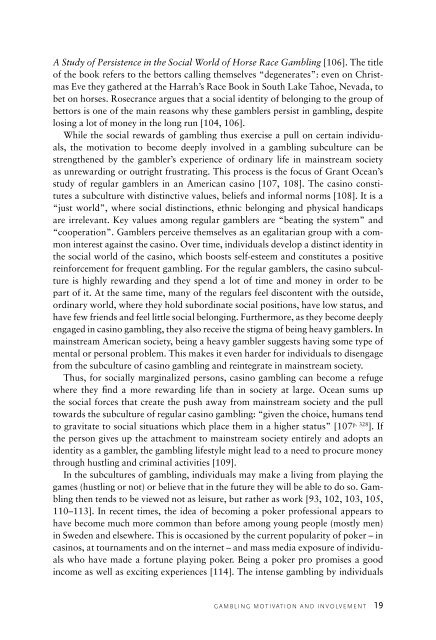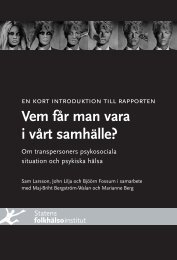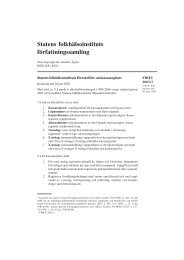Gambling motivation and involvement: A review of social
Gambling motivation and involvement: A review of social
Gambling motivation and involvement: A review of social
Create successful ePaper yourself
Turn your PDF publications into a flip-book with our unique Google optimized e-Paper software.
A Study <strong>of</strong> Persistence in the Social World <strong>of</strong> Horse Race <strong>Gambling</strong> [106]. The title<br />
<strong>of</strong> the book refers to the bettors calling themselves “degenerates”: even on Christmas<br />
Eve they gathered at the Harrah’s Race Book in South Lake Tahoe, Nevada, to<br />
bet on horses. Rosecrance argues that a <strong>social</strong> identity <strong>of</strong> belonging to the group <strong>of</strong><br />
bettors is one <strong>of</strong> the main reasons why these gamblers persist in gambling, despite<br />
losing a lot <strong>of</strong> money in the long run [104, 106].<br />
While the <strong>social</strong> rewards <strong>of</strong> gambling thus exercise a pull on certain individuals,<br />
the <strong>motivation</strong> to become deeply involved in a gambling subculture can be<br />
strengthened by the gambler’s experience <strong>of</strong> ordinary life in mainstream society<br />
as unrewarding or outright frustrating. This process is the focus <strong>of</strong> Grant Ocean’s<br />
study <strong>of</strong> regular gamblers in an American casino [107, 108]. The casino constitutes<br />
a subculture with distinctive values, beliefs <strong>and</strong> informal norms [108]. It is a<br />
“just world”, where <strong>social</strong> distinctions, ethnic belonging <strong>and</strong> physical h<strong>and</strong>icaps<br />
are irrelevant. Key values among regular gamblers are “beating the system” <strong>and</strong><br />
“cooperation”. Gamblers perceive themselves as an egalitarian group with a common<br />
interest against the casino. Over time, individuals develop a distinct identity in<br />
the <strong>social</strong> world <strong>of</strong> the casino, which boosts self-esteem <strong>and</strong> constitutes a positive<br />
reinforcement for frequent gambling. For the regular gamblers, the casino subculture<br />
is highly rewarding <strong>and</strong> they spend a lot <strong>of</strong> time <strong>and</strong> money in order to be<br />
part <strong>of</strong> it. At the same time, many <strong>of</strong> the regulars feel discontent with the outside,<br />
ordinary world, where they hold subordinate <strong>social</strong> positions, have low status, <strong>and</strong><br />
have few friends <strong>and</strong> feel little <strong>social</strong> belonging. Furthermore, as they become deeply<br />
engaged in casino gambling, they also receive the stigma <strong>of</strong> being heavy gamblers. In<br />
mainstream American society, being a heavy gambler suggests having some type <strong>of</strong><br />
mental or personal problem. This makes it even harder for individuals to disengage<br />
from the subculture <strong>of</strong> casino gambling <strong>and</strong> reintegrate in mainstream society.<br />
Thus, for <strong>social</strong>ly marginalized persons, casino gambling can become a refuge<br />
where they find a more rewarding life than in society at large. Ocean sums up<br />
the <strong>social</strong> forces that create the push away from mainstream society <strong>and</strong> the pull<br />
towards the subculture <strong>of</strong> regular casino gambling: “given the choice, humans tend<br />
to gravitate to <strong>social</strong> situations which place them in a higher status” [107 p. 328 ]. If<br />
the person gives up the attachment to mainstream society entirely <strong>and</strong> adopts an<br />
identity as a gambler, the gambling lifestyle might lead to a need to procure money<br />
through hustling <strong>and</strong> criminal activities [109].<br />
In the subcultures <strong>of</strong> gambling, individuals may make a living from playing the<br />
games (hustling or not) or believe that in the future they will be able to do so. <strong>Gambling</strong><br />
then tends to be viewed not as leisure, but rather as work [93, 102, 103, 105,<br />
110–113]. In recent times, the idea <strong>of</strong> becoming a poker pr<strong>of</strong>essional appears to<br />
have become much more common than before among young people (mostly men)<br />
in Sweden <strong>and</strong> elsewhere. This is occasioned by the current popularity <strong>of</strong> poker – in<br />
casinos, at tournaments <strong>and</strong> on the internet – <strong>and</strong> mass media exposure <strong>of</strong> individuals<br />
who have made a fortune playing poker. Being a poker pro promises a good<br />
income as well as exciting experiences [114]. The intense gambling by individuals<br />
G A M B L I N G M O T I VAT I O N A N D I N V O LV E M E N T 19

















